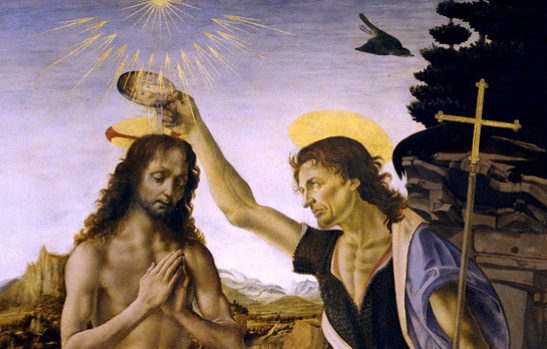I am overwhelmed by Father Romano Guardini’s presentation of Jesus being tempted. I thought of Advent as a time of absence in a way, a waiting for the arrival of Jesus, yet I am finding myself absorbed in the life of Jesus through the writing of Father Guardini. I am going to post the three temptations on consecutive days, allowing the immensity of the words to linger. The first temptation centers on the rejection of the supernatural, while embracing the natural through simplicity and honesty conforming to the will of God–the creating of a true reality through proper spiritual exercise, including the reality of satanic influence during the process.
Filled with the Spirit, Jesus goes into the wilderness, swept along by an immeasurable consciousness of mission and of strength. He fasts. What real fasting means—not the going without food imposed by necessity, but spontaneous self- denial….At first only the lack of nourishment is felt; then, according to the strength and purity of the individual nature, the desire for food vanishes, not to return for several days. When the body receives no nourishment from without, it lives on its own substance; however, as soon as this self-calorification begins to attack the vital organs, a wild, elementary hunger is aroused, and life itself is threatened. Such was the hunger of Jesus in the wilderness.
Simultaneously, another, a psychic process takes place: the body becomes more supple, the spirit freer. Everything seems to grow lighter, detached. The burden of gravity itself grows less perceptible. The limits of reality begin to withdraw; the field of the possible to widen as the spirit takes things in hand. The enlightened conscience registers with greater sensitivity and power, and the will becomes increasingly decisive. The protective mechanisms of human nature which shield man from the hidden, threatening realms of existence beneath, above, and beyond him begin to fall away. The soul stands stripped, open to all forces. Consciousness of spiritual power increases, and the danger of overstepping the set limits of human existence, of confusing its dignity and its possibilities, grows acute: danger of presumption and magic, general vertigo of the spirit. When a deeply religious person undergoes these processes his soul can become involved in crises of extreme gravity and danger. In just such a moment came the temptation by him who recognized in Jesus his greatest enemy.
How that temptation is expressed—oh, the dubiety, the provocativeness of the very first words! “If thou art the Son of God,” we are reminded of the temptation that so successfully confused humanity s original progenitors: “Why hath God commanded you, that you should not eat of every tree of paradise?” (Gen. 3:1). “Of every tree”—hellish obscurity poisoning the simplicity of obedience and trust, twilight that fakes everything, worse than the definite lie. Here it is essentially the same thing, only much more dangerous for the soul apex of human spirituality.
“If thou are the Son of God, command that these stones become loaves of bread.” Hunger is aroused; the sensation of miraculous power and the consciousness of divine sonship are questioned and accordingly enlivened. Greed is tempted to break its bonds and abuse the miraculous powers meant only for the needs of the divine mission. Everything is lured away from the pure service of the paternal will into the wilderness of confusion. But what happens? Greed is not aroused—not even its opposite, violent suppression of greed. With the complete composure of one entirely free, Jesus answers: “It is written, ‘Not by bread alone does man live. Man does live by bread, and it is good that he does, but not only by earthly bread. Even more vital is the bread “that comes forth from the mouth of God.” For this bread above all should he hunger. Confronted by such freedom, the blow can only glance off powerless.





Recent Comments